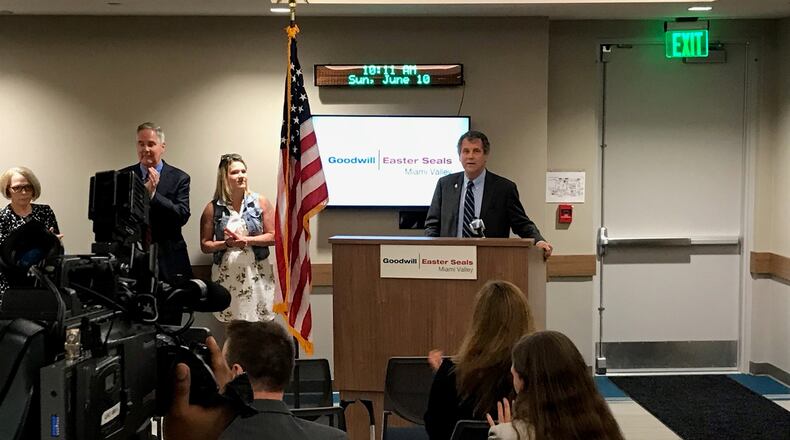Local leaders with Goodwill say a provision of a U.S. Senate bill, which would combine job training and addiction recovery services, would help them fund and grow the program.
MORE: Payday lending a ‘horrible cycle’ for some Ohioans
U.S. Sen. Sherrod Brown visited Goodwill on Sunday to highlight the work of the Dayton-based nonprofit’s Main Street Recovery Center, and highlighted pending legislation to combine federal workforce and job training grants.
The Ohio Democrat said his legislation, introduced with U.S. Sen. Shelly Moore Capito, R-W.V., could help with both employers who can’t find workers and also people recovering from addiction who can’t find work.
“We know two things, we know employers can’t find enough employees for jobs in part because of lack of training, in part because of drug testing … and we know that people who go through successful addiction treatment programs often don’t have the job skills and opportunity to get into the work force,” Brown said.
Earlier this year, Brown and Capito secured a provision in a Senate package, the Opioid Crisis Response Act, based on his CARE Act. The bipartisan package passed out of the Senate Health, Education, Labor, and Pensions Committee in April.
PHOTOS: Ever wonder where Slim Jims are made; Troy has the plant
Brown’s bill, the Collectively Achieving Recovery and Employment (CARE) Act, would combine existing grant programs at the Department of Labor and the Department of Health and Human Services to create a six-year pilot project to combine job training and addiction recovery services.
The nonprofit is most known for operating Goodwill thrift stores and supporting people with disabilities, but it also operates other services like job training. In January 2016, Goodwill also opened Main Street Recover Center in response to the increased need for behavioral health services, particularly opioid addiction treatment.
Lance Detrick, Goodwill president and CEO, said the recovery center served 122 people in its first year and is now on pace this year to serve 500 to 600 clients. About half have some type of alcohol and drug addiction, commonly opioid addiction. He said many of the clients receive medication as part of their treatment, which helps block cravings.
About two months ago, the recovery center moved into an expanded space next to Goodwill’s job services that job skills, job placement and career advancement.
“We very much believe that finding and retaining employment is a very important part of a lot of people’s path to recovery,” Detrick said.
MORE: Teradata leaving: Does Dayton have what it takes to keep tech jobs?
About the Author
